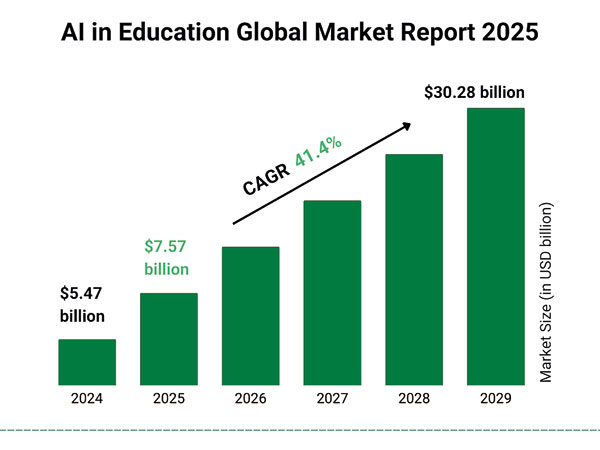Revolution or Risk? The Impact of AI on Education in 2025
View(s):Artificial Intelligence (AI) has rapidly emerged as a transformative force across various aspects of modern life, and education is no exception. By 2025, AI had firmly established itself as a cornerstone of innovation in the education sector, revolutionising how students learn, teachers instruct, and institutions operate. At the same time, it has sparked intense debate, becoming a focal point for discussions about the future of learning. The central question remains: has AI truly enhanced education as promised, or has it introduced new challenges that hinder its progress?
The Promise of AI in Education
Proponents of AI have long heralded its potential to revolutionise education. By 2025, adaptive learning platforms had become commonplace, tailoring content to the individual needs of students. These systems use algorithms to assess a student’s strengths, weaknesses, and learning pace, providing personalised recommendations for improvement. For instance, tools like AI-powered tutoring platforms enable learners to grasp complex topics at their own speed without fear of judgment.
Key Takeways:
| |
AI has also addressed significant challenges in accessibility. Students in remote or underserved regions now have access to quality education resources, including virtual labs, AI-driven translators, and even real-time subtitles for live lessons. For educators, AI has automated administrative burdens like grading and attendance tracking, allowing teachers to focus more on engaging with their students.
In higher education and professional training, generative AI tools have facilitated research, content creation, and skill development. From drafting essays to simulating real-world scenarios for medical or engineering
students, the applications
seem boundless.
The Growing Market for AI in Education
The rapid adoption of AI technologies in education is not only transforming classrooms but also driving significant market growth. According to the AI in Education Global Market Report 2025, the global market size for AI in education is projected to grow from $5.47 billion in 2024 to $7.57 billion in 2025, with a staggering compound annual growth rate (CAGR) of 41.4%. By 2029, this figure is expected to reach $30.28 billion, showcasing the increasing reliance on AI-driven solutions.

By:Eng. Chameera De Silva, MIEAust Clinical Data Scientist – Annalise.ai Lecturer in AI Doctoral Scholar in AI
This exponential growth reflects the rising demand for AI-powered tools like adaptive learning platforms, virtual teaching assistants, and data-driven analytics for personalised education. However, the rapid expansion also raises questions about equitable access and the ethical use of AI in shaping future learning environments.
The chart above illustrates the trajectory of the AI in education market, emphasising the urgency for stakeholders to address both opportunities and challenges as this sector continues to evolve.
The Concerns: A Double-Edged Sword
However, the rise of AI in education has not been without its pitfalls. Critics argue that over-reliance on AI risks dehumanising education. Personal interactions between teachers and students, often pivotal in inspiring and mentoring learners, can be diminished when technology takes center stage.
There’s also the issue of equity. While AI tools have expanded access to many, they remain out of reach for others due to infrastructure gaps or financial constraints, exacerbating the digital divide. Ethical concerns have also surfaced, with fears about data privacy and the potential misuse of AI-driven surveillance systems in classrooms.
Moreover, academic integrity has become a hot topic. The widespread availability of AI text generators has made it easier for students to produce essays and complete assignments with minimal effort, leading to debates about the very nature of learning and achievement.
The Role of Educators in the
AI Era
By 2025, a hybrid model of teaching has emerged as the preferred approach, where AI acts as a complement rather than a replacement for human educators. Teachers have taken on the role of facilitators and mentors, leveraging AI tools to enhance the learning experience while fostering critical thinking and emotional intelligence skills that machines cannot replicate.

Training teachers to effectively integrate AI into their classrooms has been a priority. Professional development programmes focusing on AI literacy for educators have become essential, ensuring that they can harness the technology’s benefits while addressing its challenges.
The Verdict: Revolution or Risk?
The answer is both and neither. AI is a tool, and like any tool, its impact depends on how it is wielded. In 2025, the world stands at a crossroads. The potential for AI to democratise education, foster inclusivity, and drive innovation is immense. Yet, without thoughtful implementation and oversight, it risks reinforcing inequalities and eroding the human connections that are fundamental to learning.
As we move forward, the key lies in striking a balance. Policymakers, educators, technologists, and students must collaborate to ensure that AI in education serves its ultimate purpose: empowering every learner to reach their full potential.
HitAd.lk is the best and biggest mobile phone market in Sri Lanka, and we guarantee you will find what you need here from our extensive listing of mobile phones for sale in Sri Lanka. Whether it’s a budget-priced smartphone for communication, or higher end features with advanced connectivity, there are many different options from which to choose from on our site!


